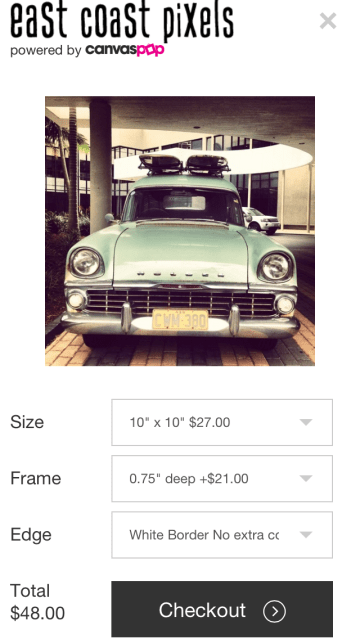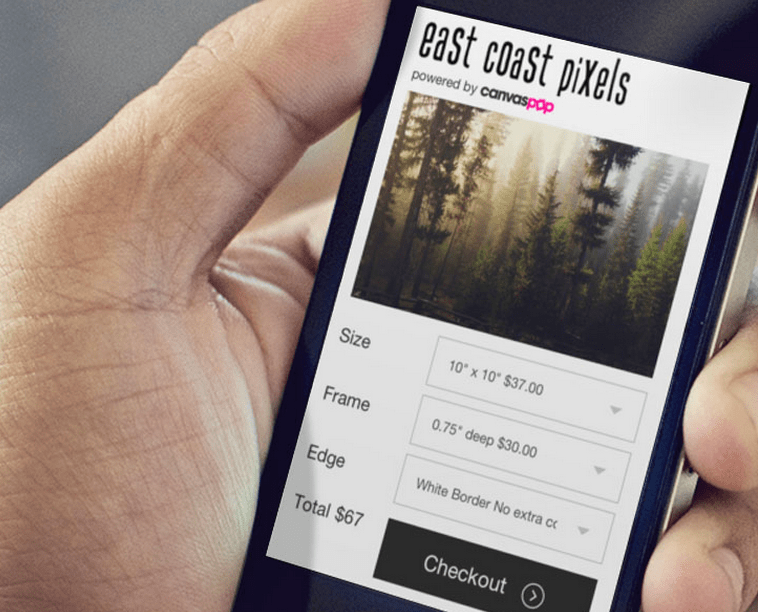There are over 30,000 photo apps, and many are dying a slow death with little way to make money. CanvasPop is about to give developers a hot cash injection by letting them earn 30% on framed photo prints sold through its new API. Alongside options like sharing to Twitter, web and mobile apps can add a “Print” button that delivers physical 8”x10” to 38” x 76”s blow-ups to a user’s door.
After Instagram skyrocketed to popularity and got bought for a boatload, everyone and their mom launched a photo app. The problem is that photo app monetization pretty much breaks down into three big categories:
1. Paid app sales – which create a barrier to download and only let developers earn money once
2. In-app virtual good purchases – which are typically cheap lenses and filters that only a small percentage of users buy
3. Advertising – which requires massive traffic and a sales team
CanvasPop is giving developers a fourth option that fits naturally in apps like photo community 500px and editing tool PhotoToaster — two of the API’s launch partners. Plus, the API works with drawing and illustration apps, or practically anything with images, so they all can say…
“Love the photo you just shot and filtered? Hang it on your wall.”
And the prints look good. CanvasPop’s homebrewed algorithms reduce noise and smooth pixelated edges while the special canvas it prints on further acts to hide imperfections in camera-phone photos. The company launched in 2009 and has become the biggest player in the large-form printing of mobile photography market by printing Facebook and Instagram photos. It has hundreds of thousands of paying customers, has been growing 80% year over year, now has 60 employees, and is earning in the ballpark of $12 million a year.
 This new API could supercharge the company’s growth while aiding developers and putting more art in people’s homes. After paying developers their 30% cut for providing the photo and sales lead, CanvasPop takes the other 70% to cover printing, shipping, and its own margin. Since it’s vertically integrated like Warby Parker and owns its own manufacturing plant in Las Vegas, that margin is healthy.
This new API could supercharge the company’s growth while aiding developers and putting more art in people’s homes. After paying developers their 30% cut for providing the photo and sales lead, CanvasPop takes the other 70% to cover printing, shipping, and its own margin. Since it’s vertically integrated like Warby Parker and owns its own manufacturing plant in Las Vegas, that margin is healthy.
CanvasPop co-founder Adrian Salamunovic tells me “Most photo apps don’t have printing. There’s a huge market for this.”
The API is easy to integrate, and CanvasPop takes care of the rest, including customer service. The storefront popped up by the API reads the photo a user wants to print and only shows “safe” printing sizes that are the right aspect ratio and won’t look blurry. High-res shots get bigger printing options like a massive 2ft x 5ft print for $277, while low-res pics can be printed as small as 8” x 10” for $49. Devs can manipulate the API to show all the possible sizes and framing options by default, or constrict them to bombard users with fewer decisions.
Yes, $49 for a print is still a lot more expensive than the typical $1 apps or in-app purchases consumers are used to. Young kids who are voracious photo sharers might not have the pocket change to pay for CanvasPops. There are also a few printing competitors to edge out, like Sincerely‘s Postagram which sells photo postcards. But if the stereotype of 20-something hipsters and their love of mobile photography holds true, there are plenty of people with empty-walled apartments who might splurge on some prints.
Salamunovic admits the photo app space is pretty bloated, saying “there’s probably more cameras than the world needs” though he loves that there’s a niche app for everyone. CanvasPop hopes it can help the best live on without selling their soul (equity) for venture capital.
Once upon a time, photography existed in the meatspace, and when friends came to your house, they’d see your best memories hung around the room. Now are photos are trapped in the digital world, but CanvasPop is a way for that art to become tangible again.































Comment